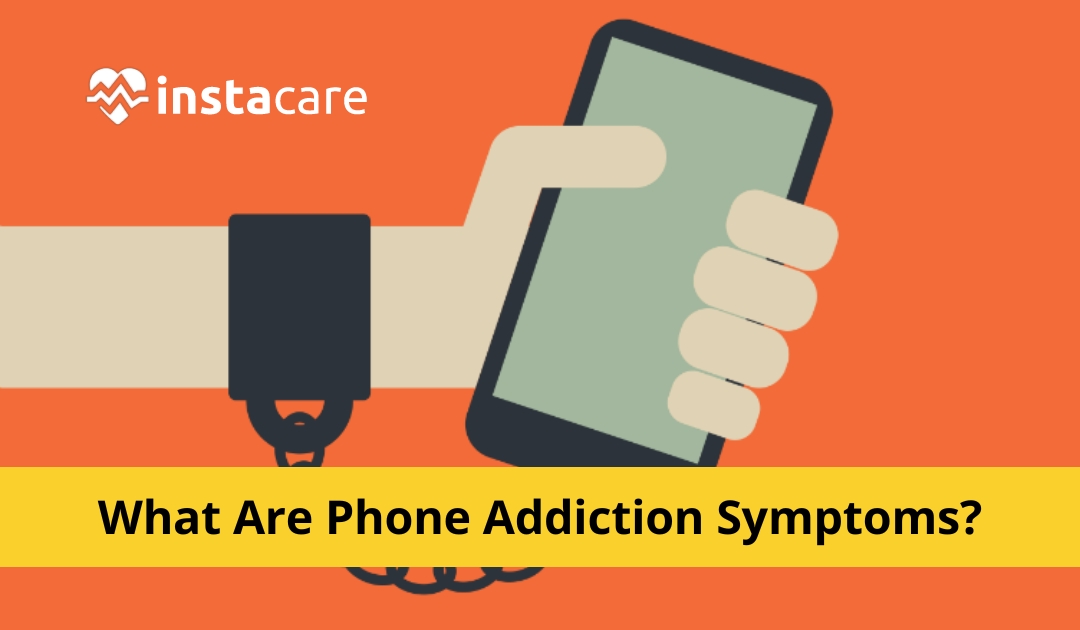Are you glued to your phone? Have you noticed a decrease in productivity or an increase in the amount of time spent scrolling through social media? If so, it is possible that you are dealing with a phone addiction. Phone addiction affects both young and old people alike, yet there remains much confusion about what symptoms make up this modern-day affliction. In this blog post, we will look at some of the most common signs and symptoms associated with phone addiction so that you can better understand how it may be impacting your daily life.
What is phone addiction?
In today's digital era, smartphones have become an integral part of our daily lives. However, excessive use of smartphones can lead to phone addiction. Phone addiction is a behavioral addiction that involves excessive and compulsive use of smartphones, resulting in negative consequences such as neglecting important tasks and relationships, insomnia, and anxiety.
A person addicted to their phone may feel an intense need to check their phone constantly, even when there are no notifications or messages. Phone addiction has become a growing concern due to the negative impact it can have on an individual's mental health and social life. It's essential to recognize the signs of phone addiction and take measures to reduce excessive phone use to maintain a healthy and balanced lifestyle.
Why this cell phone addiction?
As society becomes increasingly connected through technology, it seems that we have developed a dependence on our cell phones. From checking emails to scrolling through social media feeds, it's hard to go a day without reaching for our devices. Experts say that this addiction comes from the constant release of dopamine, a feel-good neurotransmitter, that occurs when we receive notifications or messages on our phones.
It can be difficult to break this cycle, but setting boundaries and practicing mindfulness can help. It's important to realize that while our phones can be a helpful tool, they shouldn't consume our entire lives. By finding a healthy balance, we can reduce our dependence on technology and enjoy the present moment.
What is a technology addiction?
In today's digital age, our reliance on technology has become a ubiquitous part of our daily routines. However, while the convenience and accessibility technology offers have provided numerous benefits, there is often a darker side to our dependence on it.
A growing concern that has emerged
is technology addiction, a behavior characterized by an excessive and
compulsive use of technology, which can lead to negative consequences on one's
physical and mental health, relationships, and overall well-being. With the
constant stream of notifications, social media updates, and the accessibility
of technology at all hours of the day, it's important to acknowledge the signs
of technology addiction and take the necessary steps to manage your usage.
Designed to be addictive
The phrase "designed to be addictive" brings to mind a range of different products and experiences. But what does it actually mean? When something is designed to be addictive, it means that its creators have intentionally created elements that encourage repeated use or consumption. This could mean including certain flavors or chemicals in food products, designing video games with reward systems that keep players engaged, or using specific marketing strategies to ensure that consumers keep coming back for more.
While this concept might sound sinister, it's important to remember that
not all addictive products are harmful. In fact, some things that are designed
to be addictive, like exercise or creative activities, can be highly beneficial
for our health and wellbeing.
Negative effects of phone addiction
View More: Effectiveness Of Ai Based Therapy Is It Better Than Traditional Psychotherapy
Gaba dysfunction
It's baffling to think that a handheld device could have such a profound impact on our brain chemistry, but the negative effects of phone addiction are becoming more apparent by the day. One of the most concerning consequences of excessive mobile phone use is gaba dysfunction. Gaba is a neurotransmitter that helps to regulate brain activity and promote feelings of calmness and relaxation.
However, studies have shown that long-term phone addiction can lower gaba levels, leading to increased anxiety, irritability, and even depression. With our constant need to check notifications and scroll through social media feeds, it's more important than ever to recognize the potential dangers of phone addiction before it's too late.
Decrease in grey matter
In a world where phones have become an essential tool of communication, it is not uncommon to see people engrossed in their screens every moment of the day. However, excessive phone use may lead to negative effects such as a decrease in grey matter. Grey matter, the part of the brain responsible for decision-making, impulse control, and cognitive functions, is vital for intellectual growth and emotional regulation.
Scientific studies have shown that long hours of phone use can lead to persistent changes in the structure and function of the brain, particularly its grey matter. This can result in decreased cognitive abilities, mood swings, anxiety, and even depression. It is important to strike a balance between phone use and other leisure activities to prevent phone addiction-related negative effects, as we rely on our brains for schooling, work, and daily life.
Suicide
In our fast-paced world, phone addiction is becoming more and more common. While staying connected with friends and family can be a positive thing, too much use of our phones can have devastating negative effects. One of the most serious issues related to phone addiction is suicide.
Several studies have found a correlation between high levels of phone use and increased suicidal thoughts and behaviors. It's believed that excessive phone use can lead to feelings of isolation, depression, and anxiety, which can all contribute to suicidal ideation. It's crucial to recognize the negative effects of phone addiction and take steps to limit phone use to prevent these harmful consequences.
Signs and symptoms of phone addiction
1- Constant desire to check your device
As technology has become more and more prevalent in our lives, it's not uncommon to feel like our devices have taken over. However, if you find yourself constantly checking your phone, even when you don't need to, you may be experiencing one of the signs and symptoms of phone addiction.
This impulse to check your device can quickly become all-consuming, affecting your work, relationships, and overall mental health. It's important to recognize these symptoms early on so you can take steps to manage your phone use and prioritize your real-world connections.
2- Prioritizing phone usage over other activities
Nowadays, it's common to see people with their phones in their hands constantly. However, it's important to recognize when phone usage starts to become a priority over other activities. This behavior can be a sign of phone addiction, a growing problem in our society. Some common signs and symptoms of phone addiction include constant checking of notifications, feeling anxious without your phone, neglecting responsibilities, and decreasing social interactions with the people around you.
It's important to remember that while technology has its benefits, it's also important to maintain a balance and not let it consume all of our time and attention. By recognizing the signs and symptoms of phone addiction, we can take steps to make sure we are prioritizing our overall well-being and not just our screen time.
3- Spending excessive amounts of time on your device
With the rise of technology and the popularity of smartphones, it's becoming increasingly common for people to spend excessive amounts of time on their devices. While we all enjoy staying connected and informed, it's important to recognize the signs and symptoms of phone addiction.
These may include constantly checking your device, feeling anxious or
restless when you don't have it with you, neglecting activities and
relationships in favor of your phone, and experiencing physical discomfort such
as headaches or eye strain. If you find yourself exhibiting these behaviors, it
may be time to reevaluate your relationship with your phone and make a
conscious effort to disconnect more often.
4- Becoming agitated or irritable when away from your phone
In today's world, it's common to feel restless when separated from your phone. While we use our phones for various reasons, from connecting with loved ones to browsing the web, it's crucial to pay attention to the signs and symptoms of phone addiction. One such indication of over-dependence on your phone is becoming irritable or agitated when without it. This kind of behavior might signify a deeper problem, and it's important to address it head-on.
Whether it means reducing your screen time or finding other ways to distract yourself, implementing a few healthier habits could go a long way towards restoring balance in your life. By recognizing the signs of phone addiction, we can take steps towards improving our well-being and protecting ourselves from unnecessary stress.
5- Feeling the need to be constantly connected to your device
In today's digital age, it's common to feel the need to be constantly connected to our devices. While smartphones have undoubtedly made our lives easier and more convenient, excessive usage can lead to phone addiction. Signs and symptoms of phone addiction include spending an excessive amount of time on your phone, constantly checking for notifications, neglecting important daily tasks and social interactions, experiencing anxiety or irritability when separated from your phone, and using your phone to cope with emotions or boredom. It's important to be aware of these warning signs and take steps to prioritize self-care and human connections in our daily lives.
6- Withdrawal symptoms if you are unable to access your device
With the increasing use of smartphones in our day-to-day lives, it is important to educate ourselves about the signs and symptoms of phone addiction and its potential consequences. One of the warning signs that we are too attached to our devices is experiencing withdrawal symptoms when we are unable to access them.
These symptoms can include anxiety, irritability, restlessness, difficulty concentrating, and even physical symptoms such as headaches or stomachaches. If left unchecked, phone addiction can have negative impacts on our mental health, relationships, and overall well-being. It is important to be mindful of our phone usage and set healthy boundaries to prevent addiction and avoid potential withdrawal symptoms.
Phone addiction treatment
With the increasing use of smartphones, the problem of phone addiction has become a major concern. People, especially teenagers and young adults, tend to spend a significant amount of their time on their phones, often neglecting other important tasks such as studying, socializing, or even sleeping. This overuse of phones can lead to various health issues such as insomnia, anxiety, and depression. The good news is that phone addiction can be treated.
There are various ways to treat phone addiction, such as cognitive-behavioral therapy, usage tracking apps, and self-imposed smartphone breaks. Seeking professional help can assist individuals in breaking free from their addiction and finding balance in their daily routine. It's essential to recognize the signs of phone addiction and seek help when necessary to take control of one's wellbeing and lead a healthier, happier life.
Don’t let phone addiction win
In today's world, it's no secret that technology plays a significant role in our everyday life. From social media to streaming services, our smartphones have become an essential part of our routine. However, this dependency often leads to a negative consequence - phone addiction. It's a serious concern that is affecting millions of people globally, both young and old.
The impact on physical, mental, and emotional health can be severe with the constant distraction, decreased productivity, and lack of focus due to excessive phone use. But don't let addiction win. Take a step back, set boundaries, and limit your time spent on the phone. You don't have to give up technology altogether, but an awareness of how much time you're spending and a willingness to cut back can go a long way in reclaiming your life.
Conclusion
Phone addiction can be a difficult thing to overcome, but it is definitely achievable. The key lies in being aware of the symptoms and taking appropriate steps to address them. Start by monitoring your phone use and setting boundaries on how much time you spend with it each day. Whenever you notice yourself getting distracted or feel yourself slipping into compulsive behavior with your device, take a break and step away from it for a while.
Additionally, creating healthy routines and habits that don’t involve your phone will help remind you that there is more to life than scrolling through social media platforms. With commitment and discipline, reducing phone usage or eliminating the habit altogether is possible, leading to improved mental wellbeing and creative expression. You are in control of how much time you choose to give your phone - take back that control and make the most out of life!
Please book an appointment with the best nutritionist in lahore, karachi, islamabad, and all major cities of pakistan through instacare, or call our helpline at 03171777509 to find a verified doctor for your disease.











